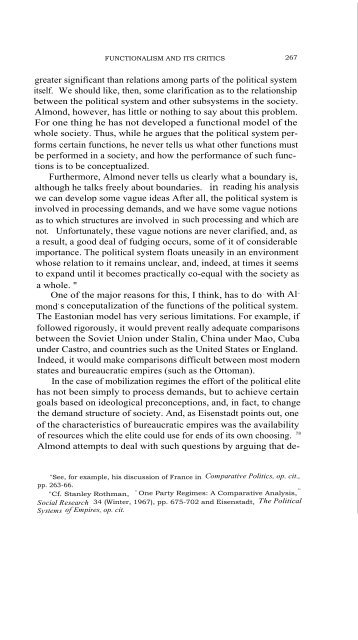FUNCTIONALISM AND ITS CRITICS - Intercollegiate Studies Institute
FUNCTIONALISM AND ITS CRITICS - Intercollegiate Studies Institute
FUNCTIONALISM AND ITS CRITICS - Intercollegiate Studies Institute
You also want an ePaper? Increase the reach of your titles
YUMPU automatically turns print PDFs into web optimized ePapers that Google loves.
<strong>FUNCTIONALISM</strong> <strong>AND</strong> <strong>ITS</strong> <strong>CRITICS</strong><br />
greater significant than relations among parts of the political system<br />
itself. We should like, then, some clarification as to the relationship<br />
between the political system and other subsystems in the society.<br />
Almond, however, has little or nothing to say about this problem.<br />
For one thing he has not developed a functional model of the<br />
whole society. Thus, while he argues that the political system performs<br />
certain functions, he never tells us what other functions must<br />
be performed in a society, and how the performance of such functions<br />
is to be conceptualized.<br />
Furthermore, Almond never tells us clearly what a boundary is,<br />
although he talks freely about boundaries. in reading his analysis<br />
we can develop some vague ideas After all, the political system is<br />
involved in processing demands, and we have some vague notions<br />
as to which structures are involved in such processing and which are<br />
not. Unfortunately, these vague notions are never clarified, and, as<br />
a result, a good deal of fudging occurs, some of it of considerable<br />
importance. The political system floats uneasily in an environment<br />
whose relation to it remains unclear, and, indeed, at times it seems<br />
to expand until it becomes practically co-equal with the society as<br />
a whole. "<br />
One of the major reasons for this, I think, has to do , with Al -<br />
mond 's conceputalization of the functions of the political system.<br />
The Eastonian model has very serious limitations. For example, if<br />
followed rigorously, it would prevent really adequate comparisons<br />
between the Soviet Union under Stalin, China under Mao, Cuba<br />
under Castro, and countries such as the United States or England.<br />
Indeed, it would make comparisons difficult between most modern<br />
states and bureaucratic empires (such as the Ottoman).<br />
In the case of mobilization regimes the effort of the political elite<br />
has not been simply to process demands, but to achieve certain<br />
goals based on ideological preconceptions, and, in fact, to change<br />
the demand structure of society. And, as Eisenstadt points out, one<br />
of the characteristics of bureaucratic empires was the availability<br />
of resources which the elite could use for ends of its own choosing. 78<br />
Almond attempts to deal with such questions by arguing that de-<br />
"See, for example, his discussion of France in Comparative Politics, op. cit.,<br />
pp. 263-66.<br />
"<br />
"<br />
"Cf. Stanley Rothman, One Party Regimes: A Comparative Analysis,<br />
Social Research 34 (Winter, 1967), pp. 675-702 and Eisenstadt, The Political<br />
Systems of Empires, op. cit.<br />
267
















